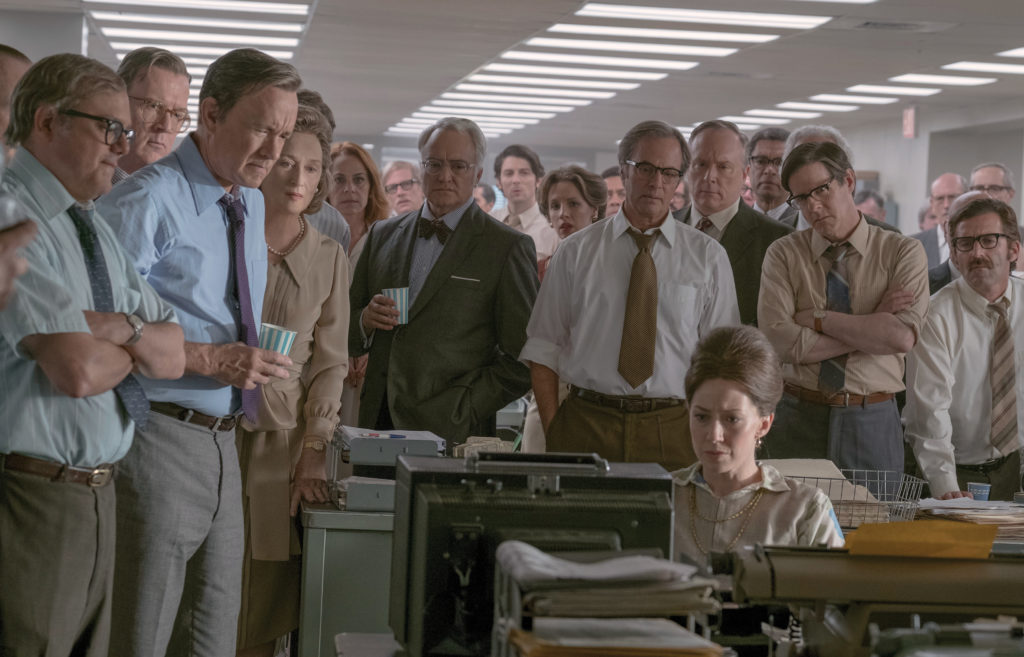The Post (2017)

Set in Washington DC in 1971, The Post covers the local newspaper, the Washington Post, who end up the recipients of what would come to be known as the Pentagon Papers, which is a top-secret government document, leaked to them from military analyst Daniel Ellsberg (Rhys, Burnt), and the New York Times, who have been barred from publishing further information about them via a court injunction imposed upon them by the White House, that shows how the United States has dealt with Vietnam over several administrations, ultimately culminating in the notion that the top brass knows that they’re sending American soldiers to die in a war they cannot win.
Meryl Streep (Florence Foster Jenkins, Ricki and the Flash) plays the Post’s inexperienced publisher, Kay Graham, who reluctantly inherited the financially struggling paper after her husband took his own life, and wants to keep it in the family as the business goes public, and Ben Bradlee (Hanks, Inferno), the executive editor, who must decide what to do when it becomes apparent that the Nixon Administration is threatening potential arrest of the newspaper in a manner that would effectively shut it down for good, despite the Constitutional protections of freedom of the press. They know that if they decide to publish, they could ruin everything they’ve built up, including their careers, but, on the other hand, rolling over to the demands of the White House could also put the First Amendment in jeopardy for the future, leaving the president and his cronies as above the law, if they commit any wrongdoing.
Directed by Steven Spielberg (The BFG, Bridge of Spies), The Post is always progressing forward and building upon stakes, even if the events of shuffling papers and reading through political documents isn’t exactly the stuff that generally makes for great cinema. The Post not only serves as a political docudrama about an important time in American politics, but also as a reassertion of the importance of a free press in order to keep those in power in check. Though it can be viewed as a film unto itself, it probably is no coincidence that it is coming out in a year in which many of these questions on whether a president can be above the law, and the role of the media, is also at the forefront of the political discussion in Washington. A President of the United States is targeting and antagonizing the press that covers them in order to keep them from digging at information that could bring down their regime has resurfaced, hence the impetus for delivering the story of The Post, which serves as a reminder of the possibilities, and the dangers, of an administration that operates by a set of standards that may be at odds with the interests and well-being of the American public they serve.
The Post‘s screenplay is by Liz Hannah and Josh Singer, who co-scripted the Academy Award-winning Best Picture, Spotlight, just a few years before. It’s a respectable effort, much like Spielberg’s other historical films of late, that relies on an older school of subdued storytelling that emphasizes nuance and psychology more so than grandiose machinations and powerhouse set pieces to ratchet up manufactured tension. As such, people who are unfamiliar with the events on display may find it a bit dry in its approach to a fairly complex set of political and economic considerations amid boardroom meetings and talking head discussions among players within the media.
With Streep and Hanks at the forefront, and a cast chock full of some of the best veteran character actors in support, The Post is an acting tour de force, as we must intuit a great deal of the motivation and determination just from reading facial expressions and body language, along with the visual cues that Spielberg leaves to make political notes of how times have changed. Previously living in a different world as a wealthy housewife, Streep is not only the publisher, but also a woman surrounded by men — men who are usually surrounded by other men in order to make decisions of business and political import. Spielberg makes the point early, as Kay Graham enters a board room as the only woman among a group of exclusively older white men who tend to perpetually treat her dismissively. Toward the end of the film, other younger women look upon Graham as she makes her courageous stand in the media and becomes an instant role model among the younger generation seeing someone of their own gender with some power and stature.
The film ends with the beginning of the Watergate break-in, which would prove to be the undoing of President Nixon in the scandalous cover-up. For more of how the press covered that story, from the Washington Post perspective, All the President’s Men is a great choice for the second half of a double feature.
Qwipster’s rating: A-
MPAA Rated: PG-13 for language and brief war violence
Running Time: 120 min.
Cast: Meryl Streep, Tom Hanks, Tracy Letts, Bob Odenkirk, Bruce Greenwood, Sarah Paulson, Bradley Whitford, Jesse Plemons, Matthew Rhys, Alison Brie, David Cross, Carrie Coon, Michael Stuhlbarg
Director: Steven Spielberg
Screenplay: Liz Hannah, Josh Singer
